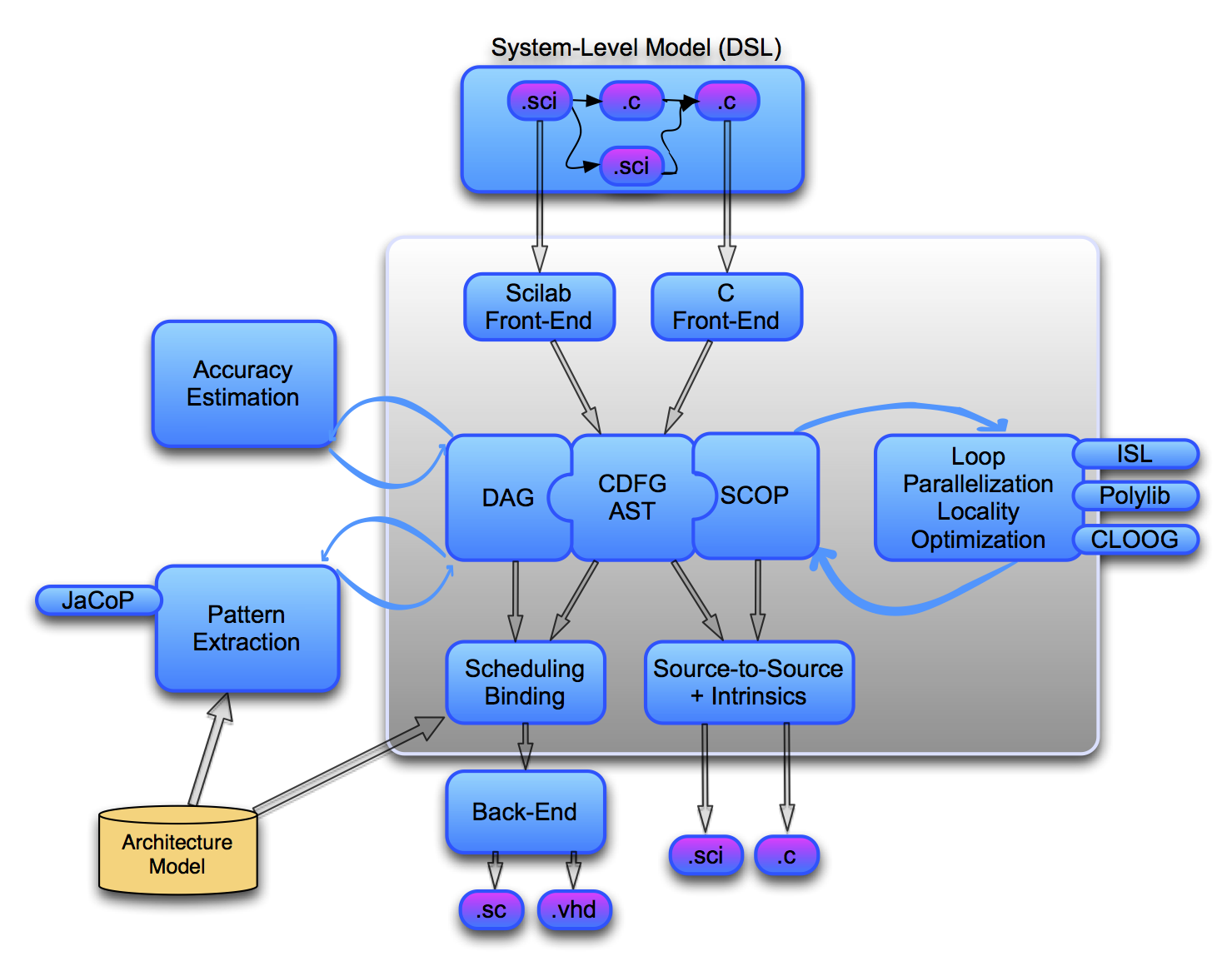Section: New Software and Platforms
Panorama
With the ever raising complexity of embedded applications and platforms, the need for efficient and customizable compilation flows is stronger than ever. This need of flexibility is even stronger when it comes to research compiler infrastructures that are necessary to gather quantitative evidence of the performance/energy or cost benefits obtained through the use of reconfigurable platforms. From a compiler point of view, the challenges exposed by these complex reconfigurable platforms are quite significant, since they require the compiler to extract and to expose an important amount of coarse and/or fine grain parallelism, to take complex resource constraints into consideration while providing efficient memory hierarchy and power management.
Because they are geared toward industrial use, production compiler infrastructures do not offer the level of flexibility and productivity that is required for compiler and CAD tool prototyping. To address this issue, we have designed an extensible source-to-source compiler infrastructure that takes advantage of leading edge model-driven object-oriented software engineering principles and technologies.
Figure 2 shows the global framework that is being developed in the group. Our compiler flow mixes several types of intermediate representations. The baseline representation is a simple tree-based model enriched with control flow information. This model is mainly used to support our source-to-source flow, and serves as the backbone for the infrastructure. We use the extensibility of the framework to provide more advanced representations along with their corresponding optimizations and code generation plug-ins. For example, for our pattern selection and accuracy estimation tools, we use a data dependence graph model in all basic blocks instead of the tree model. Similarly, to enable polyhedral based program transformations and analysis, we introduced a specific representation for affine control loops that we use to derive a Polyhedral Reduced Dependence Graph (PRDG). Our current flow assumes that the application is specified as a hierarchy of communicating tasks, where each task is expressed using C or Matlab/Scilab, and where the system-level representation and the target platform model are often defined using Domain Specific Languages (DSL).
Gecos (Generic Compiler Suite) is the main backbone of Cairn 's flow. It is an open source Eclipse-based flexible compiler infrastructure developed for fast prototyping of complex compiler passes. Gecos is a 100% Java based implementation and is based on modern software engineering practices such as Eclipse plugin or model-driven software engineering with EMF (Eclipse Modeling Framework). As of today, our flow offers the following features:
-
An automatic floating-point to fixed-point conversion flow (for HLS and embedded processors). ID.Fix is an infrastructure for the automatic transformation of software code aiming at the conversion of floating-point data types into a fixed-point representation. http://idfix.gforge.inria.fr .
-
A polyhedral-based loop transformation and parallelization engine (mostly targeted at HLS). http://gecos.gforge.inria.fr .
-
A custom instruction extraction flow (for ASIP and dynamically reconfigurable architectures). Durase and UPaK are developed for the compilation and the synthesis targeting reconfigurable platforms and the automatic synthesis of application specific processor extensions. They use advanced technologies, such as graph matching and graph merging together with constraint programming methods.
-
Several back-ends to enable the generation of VHDL for specialized or reconfigurable IPs, and SystemC for simulation purposes (e.g., fixed-point simulations).



